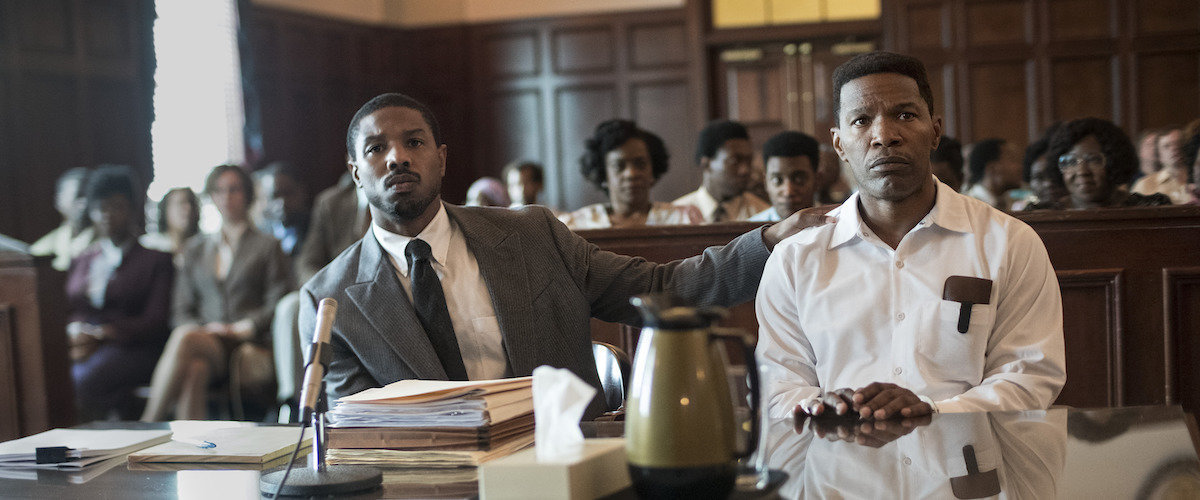Just Mercy
Just Mercy, 2019, 2 ¾ stars
Advocacy cinema
Just Mercy tackles justice system’s inequities

Michael B. Jordan (left) and Jamie Foxx star in Just Mercy. (image copyright Warner Bros. / Endeavor Content)
Exclusive to MeierMovies.com, January 14, 2020
“As you grow older, you’ll see white men cheat black men every day of your life, but let me tell you something and don’t you forget it: Whenever a white man does that to a black man, no matter who he is, how rich he is, or how fine a family he comes from, that white man is trash.”
That’s what Atticus Finch told his children in the 1930s in the fictional town of Maycomb, Alabama, in Harper Lee’s To Kill a Mockingbird. One would hope that lesson had been learned by 1988, when Walter McMillian, a poor black man, was wrongfully convicted of murdering a white woman in Lee’s real hometown of Monroeville, Alabama. Some lessons bear repeating.
Writer-director Destin Daniel Cretton (Short Term 12) certainly thinks so, and his third narrative feature spends a patient 136 minutes reacquainting us with both McMillian and Bryan Stevenson, the lawyer who fought to prove McMillian’s innocence and free him from death row. Stevenson, who founded the Equal Justice Initiative and wrote the nonfiction book upon which this film is based, also worked to free countless other falsely accused individuals, and Just Mercy focuses on two other men in addition to McMillian. But McMillian is the core of the movie, and Jamie Foxx’s touching, powerful portrayal is the main reason the film rises above its predictable structure and occasionally heavy-handed, preachy writing.
As Stevenson, the usually reliable Michael B. Jordan (Fruitvale Station, Black Panther) is sympathetic but delivers a mostly paint-by-numbers performance, as if he’s reciting legalize instead of truly comprehending it. The same goes for Brie Larson (Room, Avengers: Endgame), who is given surprisingly little to do as Stevenson’s assistant. (This is Cretton and Larson’s third collaboration.) But Tim Blake Nelson (of Coen Brothers fame) is mesmerizing – complete with facial tics and thick Southern dialect – as Ralph Myers, the man whose false testimony was originally used to convict McMillian. His performance is so quirky, in fact, that it upstages everyone else’s, but it nevertheless injects a much-needed stylistic flourish into an otherwise unremarkable film. And, together with Foxx, Nelson provides the emotional punch that McMillian’s heartbreaking story deserves.
Despite that aforementioned emotional high and some genuine tension during the film’s finale, Just Mercy sometimes seems too pat, too familiar. Unfortunately, we’ve seen all this before. But that’s not so much a fault of the film as a fault of the American justice system, which keeps killing mockingbirds.
© 2020 MeierMovies, LLC
For more information on the movie, visit IMDB and Wikipedia.